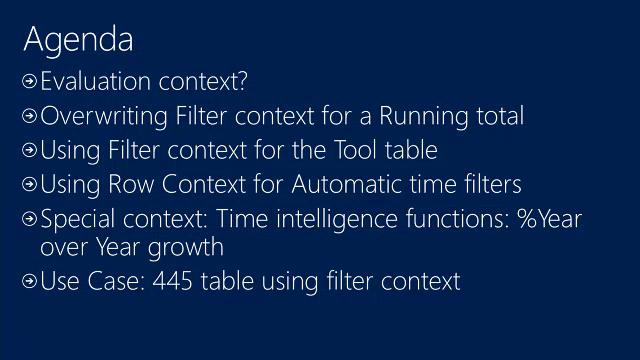This is a continuation of my series on “best of” from TechEd 2014. This session by Kasper de Jonge makes my best of list. It is quite technical in places and digs in deep. I particularly like when he talks about “evaluation context”. Erik explains that there are 2 types of context (row context and filter context) and why it matters. The other thing really interesting in this session is that Erik describes how the development team uses (what he calls) ‘syntax sugar’ to create new functions that the user sees, but under the hood DAX is actually using a more complex calculation using other existing functions.

| Time Stamp | Description |
| 0:00 | Introductions and background |
| 2:28 | Agenda |
| 3:40 | What is evaluation context? A great bit of information at the 20 min mark about how “nested” measures are calculated – innermost |
| 6:00 | Demo: Running Totals |
| 21:00 | Demo: Tool Table (disconnected table example). He uses Values() to detect the “type” of data, and then uses a switch statement to select which measure to display in the pivot table, and explains how to prevent errors in Grand Total columns. |
| 35:00 | Demo: Time Intelligence example where you can create a “current month” calculated column that automatically updates with each new month, meaning you don’t have to change your pivot table each month. |
| 40:00 | Demo: Several row context examples for both columns and measures. He explains how using ‘calculate’ in a calc column will give you filter context, and now row context |
| 48:00 | Demo: Time Intelligence year on year growth. |
| 57:30 | Demo: Time Intelligence with a 445 calendar. |
| 63:40 | Q&A |



I don’t think the title of your article matches the content lol. Just kidding, mainly because I had some doubts after reading the article.
Your point of view caught my eye and was very interesting. Thanks. I have a question for you.